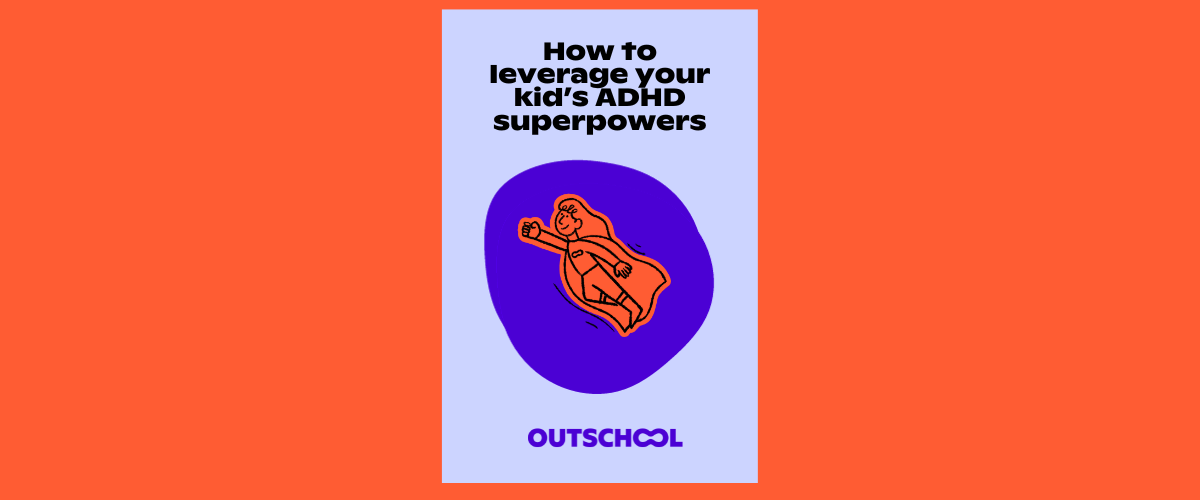Julie struggled as a kid in school. She wanted to be active and out of her seat, but traditional classroom settings didn't allow that. Parents with neurodivergent kids or who are neurodivergent themselves know that it can be a challenge.
Being differently wired often means being driven to experience the world, not sitting passively as a teacher talks about it.
Here's the thing: there's nothing wrong with that! Your child’s neurodivergent skillset is amazing and deserves to be appreciated.
Educators like Julie Alvarez are taking their own neurodivergent experiences and working hard to flip the script for kids like them. She’s one of Outschool's 5-star rated educators, teaching classes on everything from using Minecraft to learn about finance, to math storytime, to choose your own adventure creative writing.
In our recent Outschool Live, our Community Guy Fernando interviewed Julie about how she uses Minecraft, brick building, and social groups to engage neurodivergent kids.
This article includes some key takeaways, but it’s definitely worth hearing for yourself. (And stay tuned for some great upcoming Outschool Live conversations!)
Whether you homeschool or want to supplement your neurodivergent child's traditional education, this conversation is for you. Keep reading to learn how parents can use games like Minecraft and other engaging activities to bring out their unique kid’s superpowers.
Meet Julie Alvarez, Outschool Educator
Award-winning educator Julie Alvarez is a parent, homeschooler, and educator on Outschool. She's been teaching on the platform since 2020 and even won the Outschool Best in Class Award in 2022.
Julie focuses on celebrating neurodiversity in all of her classes. As a neurodivergent educator and homeschooling parent, she understands what children struggle with in traditional classrooms.
Julie's classes are built around socializing and play as ways to learn. Whether she's leading a brick-building social club or teaching geography through Minecraft, she's passionate about empowering learners.
Julie's enthusiasm and energy have earned her a reputation as a stellar and creative educator who understands neurodiverse learning communities.
What is neurodiversity?
As Julie notes, we're all wired differently. No two people have brains that work exactly the same. Maybe your child has a diagnosis or is on the autism spectrum. Or maybe you've just noticed that they think a little differently about situations and problems than you would.
Julie and Fernando share that many parents gravitate towards Outschool because they're looking for online classes for neurodiverse learners.
Others are eager to find social clubs for autism that help kids on the spectrum develop stronger interpersonal skills. One thing many of these parents share in common is that they don't know where to start. Some feel guilty because they want their kids to get a high-quality education, but they're unsure they can overcome the perceived obstacles of neurodiversity.
But don't worry—reaching neurodivergent kids might be easier than you think. Julie puts it all in context when she talks about taking chemistry in high school. She remembers doing well in the course but confesses that she just memorized the material for the tests and didn't retain any of it.
Have you ever experienced that with your children? A lot of homeschoolers have. You spent a whole school year working on multiplication facts, but your kids don't remember them a few weeks later. It can be frustrating, but there's a reason it happens.
Julie sums up the experience of learning something without really grasping it perfectly: "It didn't mean anything to me, so I didn't care." Years after her classroom experience, she came back to chemistry while exploring Minecraft. Now the subject is exciting for her, and she loves learning new material.
It's the same for many neurodiverse students. They want to engage with something that they're passionate about instead of being forced to learn something arbitrary. Games can be used as a tool to inspire these learners while teaching them essential social and academic skills.
FIRST MONTH FREE!
Get support that meets kids where they are.
Learn moreUsing games & social groups to encourage exploration
When Julie is teaching a class, she thinks of herself as a guide. She shares that neurodiversity isn't something to be navigated around; it's something to be embraced. Her students are explorers, and they're all on a mission to work together and do something new. Many kids see this as play and are happy to participate.
But Julie knows a secret: They're really busy learning.
For example, in one of her Outschool classes, Julie's students built the United States using Minecraft. Kids were encouraged to learn about different landmarks they'd like to visit and build them too. They didn't fight or argue about doing a 'boring' geography lesson.
The kids dove in and started creating because they understood the world of Minecraft and were eager to try a new challenge.
Igniting the superpowers of neurodiverse kids
It can be easy to forget—as Julie reminds us—that "playing is the job of kids." It's what they're made to do. Play is packed with learning opportunities too. From the youngest ages, children learn to understand and negotiate their environment through play. Play builds critical thinking skills, motor skills, and social skills.
That's why you'll often find tutors for neurodiverse learners using games and creative activities to guide learning. Games and social activities are also a common feature of classes for kids with autism.
When children are comfortable with the activities they're doing in a class, their nervous systems relax, and they become more receptive to new information.
Throughout the video, Julie shares how she uses play to direct learning experiences. She also talks about the importance of focusing on why kids love different games and activities. For example, some love brick building because it helps them visualize stories and places they've created in their minds.
When parents understand why neurodiverse kids love something, they can find classes that meet their learning needs without arguments or tears. It's the knowledge that empowers you to find the right multisensory classes for kids with dyslexia or kids with ADHD.
Julie suggests playing your child’s favorite game with them to understand what they enjoy about it. You might also learn how to leverage that game to encourage learning.
At Outschool, we think of this as igniting your neurodiverse child’s superpowers. Every neurodiverse individual has unique skills that should be embraced and encouraged. Gaming and playing are wonderful ways to support those skills.
After all, classes that use games and social experiences to engage students help develop essential 21st-century learning skills like:
- Critical thinking
- Creativity
- Collaboration
- Communication
Celebrate and support your neurodiverse kid with Outschool
Teachers and educators like Julie Alvarez are the heart of Outschool. We're an online community dedicated to meeting the needs of all learners.
We embrace neurodiverse kids and are proud to offer classes designed specially to harness their superpowers. From classes to tutoring, Outschool is proud to partner with you in supporting and celebrating your neurodiverse child.






.svg)
.svg)







